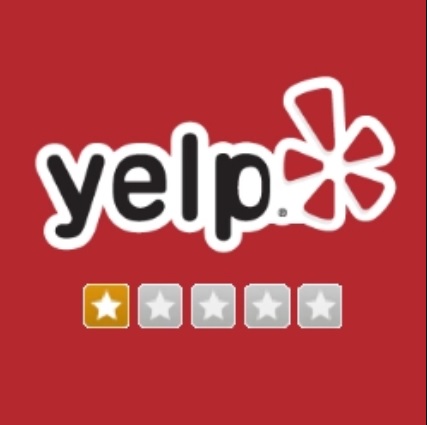How Should Yelp One Star Reviews Be Monitored During Pandemic?

It can be very detrimental to a company to get Yelp one star reviews. As restaurants struggle during the pandemic, many owners wish Yelp would do more than appeal to its users to be “empathetic and patient”
When Arsalun Tafazoli opened his first restaurant, each bad review felt like a punch to the gut. “I can still remember that anxiety,” he says. “You put everything you have into building this place, and someone goes on this platform and just says something shitty. It’s impossible to not go down this really dark hole.” Until the coronavirus pandemic, it had been years since a Yelp review kept Tafazoli up at night.
His San Diego-based restaurant group Consortium Holdings consists of 15 bars and restaurants across the city, and one bad review doesn’t feel like enough to sink his business the way it used to. But like restaurant owners across the country, he’s in a different position now. As the pandemic takes its toll on even the largest and most financially sound restaurant groups — it temporarily shuttered all of Consortium’s bars and restaurants, seven of which have since reopened — Tafazoli’s reminded once again of how much control the platform holds over a restaurant’s fate. Even with Tafazoli’s dining rooms closed, reviews have continued to trickle in. “It sucks that we get reviews from people that came in two months ago. And they just left one star because they had a bad experience then,” he says. “Even being closed, we’ve continued to get both very negative and positive reviews, but they are based on experiences that were in a different kind of world.”
During a crisis that has left the restaurant industry in an unimaginably fragile state, some restaurant owners think Yelp — which lists restaurants as its second-most reviewed type of business, and thus a sector it makes a huge amount of money on — could do more. Yelp has acknowledged the current moment by imploring reviewers to take a restaurant’s precarious position into account before leaving a review, noting that reviewers should “remain empathetic and patient with businesses.” But the platform’s concurrent claim that “reviews remain as important as ever during COVID-19,” raises some eyebrows. The encouragement to leave Yelp reviews comes as most professional restaurant critics essentially put their criticism on pause, instead writing more broadly about the implications of dining out, or the challenges many in the industry are facing.
Pim Techamuanvivit, of Nari and Kin Khao in San Francisco, and Nahm in Bangkok, for one, was frustrated by some of the reactions as her restaurants shifted to takeout-only. “If we get a Yelp review about our take-away service I’m gonna lose it,” she wrote on Twitter in late March, a week into San Francisco’s ordered restaurant shutdown. “The other day someone was furious that we couldn’t just find some squid to add to his pork jowl order because that’s how he likes them. We were like, oy, did you know [there’s] a bloody apocalypse on!” Techamuanvivit says that, at the time, all of her attention was focused on ensuring she could safely source ingredients, and make sure her staff remained insured.
It’s not news that restaurant owners and Yelp users don’t always see eye to eye. A high rating on Yelp can be an enormous driver of business for independent restaurants, but a low one can be detrimental, and chefs often make no effort to hide their disdain for the crowdsourced reviewing platform. Nevertheless, many of the platform’s most avid users view themselves as restaurants’ greatest supporters during this crisis.
“I want to make sure I’m bringing attention to these restaurants,” says Scott Hockett, a Yelp user in Madison, Wisconsin, who started writing Yelp reviews in 2012. “People are reading my reviews. I want people to help these restaurants get back on their feet sooner than later. I think Yelp can be very powerful for that.”
Nancy Lu, a reviewer based in New York City, says that if she really doesn’t like a meal, she just doesn’t leave a review. “You are leaving a review that can potentially have greater consequences on the outcome of a particular restaurant. That’s somebody’s livelihood,” she says. During the pandemic, there’s a new question in her mind every time she eats a less-than-perfect meal: “How much of it can you really attribute to the restaurant?”
In late May, Andrea Rubin, Yelp’s SVP of Community, penned a letter to Yelpers, encouraging them to be “mindful and understanding” of the current challenges business owners face. In the letter, she laid out the many ways restaurants might be struggling right now: a rush of to-go orders, a pared down menu, reduced hours and limited staff, a general sense of chaos as restaurants adjusted to an entirely new business model. She asked that reviewers be considerate of these obstacles, and thoughtful in the comments they leave.
In reality those are just a few of the obstacles that have popped up in the past four months. And for many restaurant owners and workers, online complaints about lukewarm takeout or iffy service are a reminder of the chasm between workers and those of us hunkered down, sheltering in place. For chefs who have fought tooth and nail just to stay open this long, normalcy is a lofty expectation to meet.
Yelp has responded to the current crisis with a timely call to action, asking reviewers to be more considerate of the challenges restaurants now face. But even before the pandemic, restaurant owners often struggled with the platform’s relative lack of moderation. In the early days of restaurant ownership, Tafazoli remembers reviewers writing that his restaurant looked “too sketchy,” but never bothering to come inside for a meal. Tafazoli would fight the platform to have those reviews removed, to little avail. He hopes that Yelp will do more than ask its users to be empathetic during a crisis that has hit restaurants particularly hard.
“The very future of our industry is at stake,” he says. “Yelp has more of a responsibility to make sure that [reviews] are a real reflection of an experience at that restaurant.” Ultimately, he believes the platform has a responsibility to actively moderate reviews, instead of leaving restaurant owners to battle it out in the comments section. “On some level,” he says, “Yelp needs us as much as we need them.”
But Yelp’s position on moderating negative comments remains relatively hands-off. On its website, users are encouraged to report questionable reviews, though Yelp makes its position clear: “We don’t typically take sides in factual disputes and generally allow Yelpers to stand behind their reviews.”
In late May, an upset Yelper left a negative review on the business page of NYC pizzeria Paulie Gee’s, after an interaction with an employee at the pizzeria’s takeout window. In his two-star review, the customer called the employee a “hipster window boy,” which infuriated Paulie Gee’s owner Paul Giannone. Before the pandemic, Giannone says, “the only time I would respond [to a reviewer on Yelp] is to apologize… But the COVID situation really sent me off.” In response, Giannone told the reviewer to “cut him a break,” and started an Instagram account called Hipster Window Boy, as a place for restaurant owners to show appreciation for their employees. The Instagram account has yet to take off — as of publication, it has 393 followers — but Giannone says he created it to turn a bad situation into something positive.
Giannone doesn’t take issue with individual reviewers, so much as with the platform itself. “A lot of people have a problem with the fact that anybody can go on [Yelp]. I’m fine with that, it gives me an opportunity to see when maybe I’m not noticing that we’re not doing things the way we should,” he says. “I don’t like how Yelp is administered. What I really don’t like is when somebody puts something out there that’s slanderous, or untrue.”
For the most part, Giannone says that reviews of Paulie Gee’s have been positive during the pandemic, coming from customers that see how hard his team is working. “I think that people realize this is not the time to knock somebody, and they are understanding,” he says. “I have to think that when we reopen people are going to be understanding. And if they’re not, I’ll take that same approach and point out that, ‘Hey, this isn’t the way we normally operate. Maybe you should take that into consideration before you knock us with a one-star or two-star review.’” Yelp one star reviews should be better monitored by the company itself.


